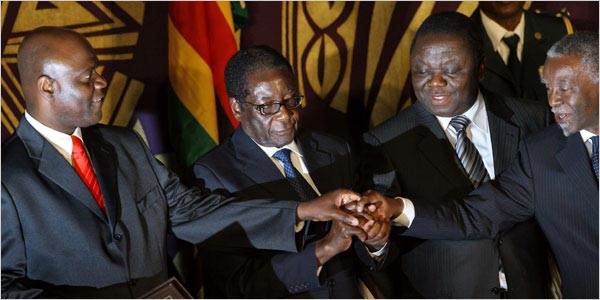
LIKE with the past two years, Zimbabwe begins 2013 with uncertainty.
REPORT BY NQABA MATSHAZI But unlike the past two years, political leaders have resigned themselves to having elections held this year without fail.
However, as with 2011 and 2012, the conditions for holding a free, fair and credible poll are still outstanding and that casts a pall over the elections and the year as a whole.
Since its December 2010 conference, Zanu PF has made it no secret that it wanted elections the following year, but it was rebuffed by its coalition partners, who insisted on the implementation of key reforms.
But with parliament’s five-year term drawing to an end, there is inevitability about elections, with most of the so-called key reforms being thrown out of the window.
In 2010 the buzz words were “outstanding issues”, among them the appointments of governors, the Attorney General and the Reserve Bank governor.
Prime Minister Morgan Tsvangirai accused his coalition partner, President Robert Mugabe of ignoring the tenets of the Global Political Agreement (GPA) by unilaterally appointing office bearers.
In 2011, the tune had changed, with the most dominant issue being the so-called roadmap to elections, fronted by Sadc’s point man on Zimbabwe, South African President Jacob Zuma.
- Chamisa under fire over US$120K donation
- Mavhunga puts DeMbare into Chibuku quarterfinals
- Pension funds bet on Cabora Bassa oilfields
- Councils defy govt fire tender directive
Keep Reading
Zuma and his facilitation team insisted that Zimbabwe could not go for an election without implementing the road map, which included media, electoral and constitutional reforms.
Mugabe and his Zanu PF party insisted on holding elections but again the two MDCs resisted and had the backing of the regional grouping.
In 2012 the key issue was the drafting of a new constitution, which again Mugabe said he wanted completed early to enable the country to hold elections.
No sooner had the drafting been concluded than a new controversy arose, Zanu PF insisting that the draft ignored the wishes of the people.
A cabinet committee is handling the latest impasse and this has cast a long shadow over the country’s capacity to hold elections in 2013.
Were the stand-off broken, questions remain on whether the country will be able to implement the reforms before going to the polls.
Mugabe wants an election in March, parliament is yet to debate the draft, a referendum is still to be held, making it almost nigh impossible for an election then, unless polls are held under the present constitution.
Political analyst, Effie Ncube said he believed Zanu PF would not budge on any further reforms in the security or media sectors, just like they had not in the past few years.
“They will not legislate themselves out of power nor bring reforms that threaten their hold,” he said. “There is no possibility of further reforms, institutionally or procedurally.”
Ncube said he expected that there would be a new constitution, which would, however, not be very different from the present Lancaster House Agreement.
“I believe there will be a new constitution, but it will not measure to international norms of a democratic constitution,” said Ncube, who heads of the National Association of Non-Governmental Organisations.
Zimbabwe running out of time—analyst
Dumisani Nkomo, a political analyst, said Zimbabwe was caught between a rock and a hard place, as the country needed to implement reforms yet it had run out of time to hold elections.
“The processes that lead to an election have been going around in circles for the past three years, yet constitutionally we are supposed to have an election this year, so this adds to the confusion,” he said.
Nkomo said this uncertainty was likely to continue for a while, hence the country found itself in a dilemma.










